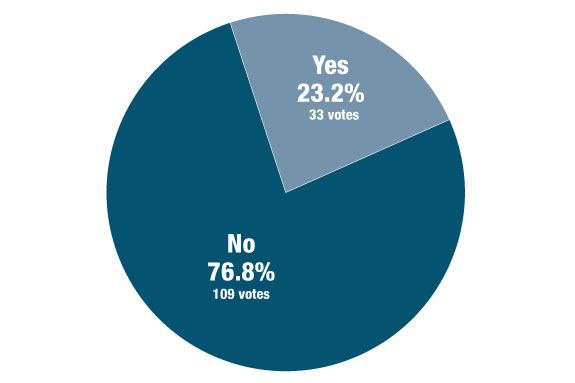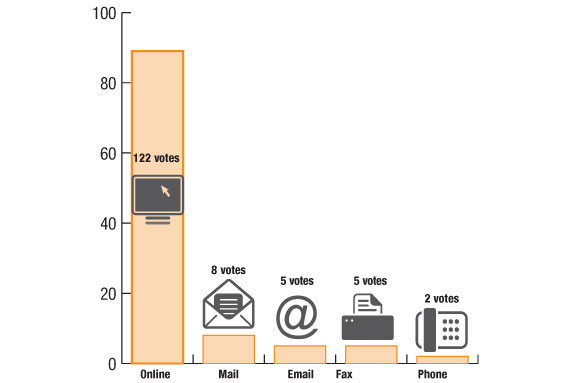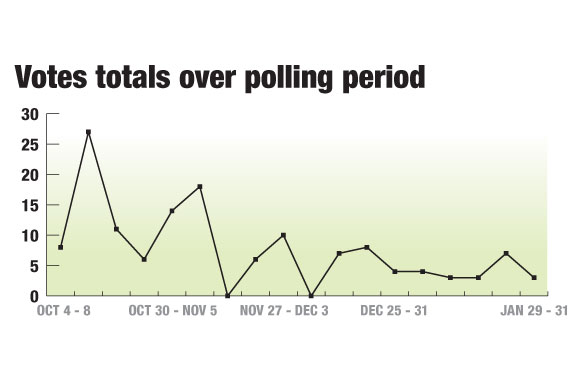Poll: Dairy Security Act receives little individual support The latest poll questioning, “Do you support the Dairy Security Act of 2011?” is one of a handful of polls Progressive Dairyman has done on dairy policy reform since the producer outcry for something to be changed in the midst of 2009. Yet the results indicate we are still far from reaching a favorable majority consensus in the industry.

According to the results, 23 percent of voters supported this act, while 77 percent were opposed.
These results question the claim by some groups that this is the most-supported piece of dairy legislation on the table. It may have group support, but the poll showed individual support was lacking.
However, when taking into consideration the results of the earlier version of this question, it does seem to slowly be picking up more grassroots support.
If you recall, this segment began by asking “Are you in favor of the Foundation for the Future (FFTF) dairy policy plan?”
When that plan was modified and drafted into legislation, Progressive Dairyman reset the poll. At that time FFTF only found 18 percent of readers to be in favor, with 82 percent against. One could summarize that making the program voluntary brought an additional 6 percent on board with the plan.

Of course, our more recent poll results are based on just 142 votes, and there certainly could be an elusive silent majority out there.
Or it is possible producers do not personally support the plan but think it’s good for others.
What’s next?
Last fall, the Dairy Security Act of 2011 was incorporated into the farm bill package sent to the supercommittee. When the committee failed to act, the bill remained in the House Subcommittee on Livestock, Dairy and Poultry.
Because congressional supporters don’t believe it can be passed on its own, they are waiting for an appropriate vehicle, which is very likely to be the next farm bill.
“The next steps for the Dairy Security Act depend on the path forward for the new farm bill. At this point, I anticipate the Agriculture Committees taking up the bill in February, with the principles of the Dairy Security Act included.
I think it’s possible to finish a new farm bill in May or June. If that doesn’t happen I would hope we could wrap it up following the elections,” states Rep. Collin C. Peterson (D-Minnesota).
The likelihood of the final version mirroring what has already been presented is minimal. Congress has yet to take its turn at alterations and, in fact, the bill has already been modified since the latest version released to the industry.
 “The Dairy Security Act was part of the farm bill package the committee leadership developed as part of the failed supercommittee process. The language has not been released, but we did make a few changes from the initial legislation.
“The Dairy Security Act was part of the farm bill package the committee leadership developed as part of the failed supercommittee process. The language has not been released, but we did make a few changes from the initial legislation.
For example, a lower margin insurance premium is available for the first four million pounds of production. Industry consensus and support on Capitol Hill continues to grow,” Peterson says.
Progressive Dairyman appreciates all of its readers that shared their opinions with us over the last few months, but if you truly want to make an impact in the future of dairy policy reform, contact your congressman or congresswoman, as they will be making the final decision on your behalf. PD
Yes
American Farm Bureau Federation
Continental Dairy Products
Cooperative Milk Producers
Association, Inc.
Darigold, Inc.
Dairy Farmers of America
Dairy Producers of New Mexico
Dairylea Cooperative Inc.
Farmers Cooperative Creamery
Foremost Farms USA
Holstein Association USA, Inc.
Idaho Dairyman’s Association
Land O’Lakes, Inc.
Lone Star Milk Producers
Maryland & Virginia Milk Producers Association, Inc.
Michigan Milk Producers Association
Milk Producers Council
Missouri Dairy Association
National Council of Farmer Cooperatives
National Milk Producers Federation
Northwest Dairy Association
Oregon Dairy Farmers Association
Prairie Farms Dairy, Inc.
Select Milk Producers, Inc.
St. Albans Cooperative Creamery, Inc.
United Dairymen of Arizona
Upstate Niagara Cooperative
Washington State Dairy Federation
Wisconsin Farm Bureau Federation
No
Dairy Security Act of 2011 was crafted for the processor, not the producer. S-1640 is a much better option! Supply management without control on imported MPC makes no sense.
Ronald Byler
Byler Bros Farm
Spartansburg, Pennsylvania
No
A terrible idea! Exports are the key to better dairy prices. Cutting production in periods of low prices is no way to become a consistent supplier in world markets. Serve world customers, and better prices will come. We must stop trying to manipulate markets – concentrate on serving them.
George Mueller
Willow Bend Farm
Clifton Springs, New York
No
Agri-Mark
Americans for Tax Reform
California Dairies, Inc.
Citizens Against Government Waste
Dairy Business Milk Marketing Cooperative
Dairy Policy Action Coalition
International Dairy Foods Association
National Taxpayers Union
Wisconsin Cheese Makers Association
Wisconsin Dairy Business Association
Yes
CONTRASTING VIEW
2009 was a devastating year for dairy farmers. A perfect storm of plummeting milk prices and sky-high feed costs combined to push profit margins to the brink and force many farmers out of business.
Many who survived saw their savings wiped out and have debts that will take years to repay. We can’t afford a repeat of 2009.
And we won’t have to, thanks to a dairy policy reform bill introduced by a bipartisan group of members of Congress.
The Dairy Security Act offers the best hope in a generation for improving federal dairy policies. It offers farmers a solid safety net, allows for growth, assures an abundant supply of milk for consumers and saves tax dollars.
The key is to re-orient government dairy programs from an emphasis on price, to a focus on maintaining adequate margins. It was a crushing cost-price squeeze caused by record-high feed costs and weakened international demand that forced some farmers out of business two years ago, and it is tight margins that are causing problems today, even with relatively better milk prices at the farm gate.
The proposed plan would scrap the current failing farm-level safety net and establish what amounts to an insurance program to protect farm income when margins shrink to dangerous levels. To prevent steep milk price declines or prolonged low-margin situations, a standby program would limit milk production for short periods.
These programs would also be voluntary, so those who do not want to participate can opt out. This gives dairy farmers the choice between a completely free-market approach and one where the government provides a basic safety net, but also requires producers to regulate their milk output when necessary.
The Dairy Security Act would help farmers deal with the wild price swings that have plagued the dairy business in recent years. Perhaps most importantly, it saves the government money – more than $160 million over five years, according to the Congressional Budget Office – at a time when all federal spending is under scrutiny.
This country has the best dairy producers in the world. We need a safety net that works for us and that keeps pace with the challenges facing our industry.
This plan offers the best hope for future stability and growth. It deserves the support of all dairy producers and quick adoption by the House and Senate.
Bob Kran
Kran Dairy Farm
Free Soil, Michigan





